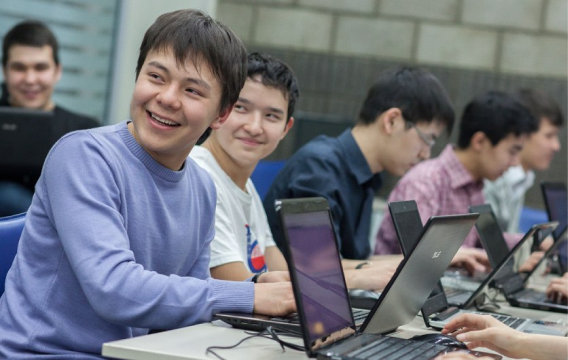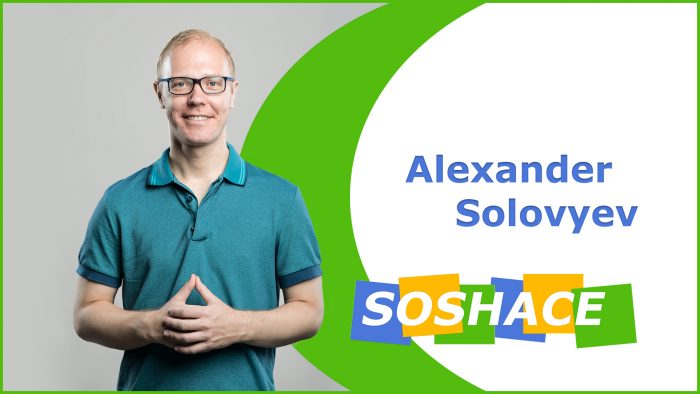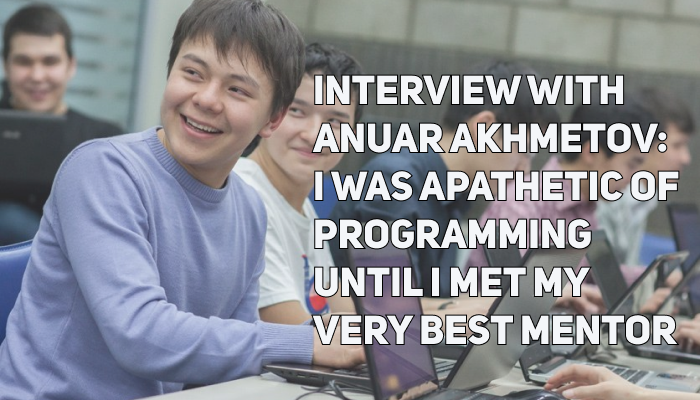
I talked to Anuar Akhmetov, a Python developer employed by Soshace, who related his passion for programming, talked about finding the right mentor, changing the education system in post-soviet countries, and finally, how freelance could possibly change anyone’s life for the better.
Hello Anuar, and thanks for accepting my invitation for an interview. Please, tell me about yourself. How and when did you decide to pursue a programming path?
Hey and thanks for the invitation! I was born in the provincial city of Karaganda, Kazakhstan. I studied in a mathematical class, which was particularly advanced and which gave me a strong foundation in mathematics and physics. I was an excellent student up to the seventh grade. I participated in various competitions and won several prizes at republican olympiads. At the same time, I practiced judo and showed impressive results. I remember the feeling when I became a champion of a prestigious competition and came back home holding a medal and a DVD player as a prize in my hands. I was extremely excited and decided to fully immerse myself in sports. Constant training and traveling took their toll and I ended up missing out in school.
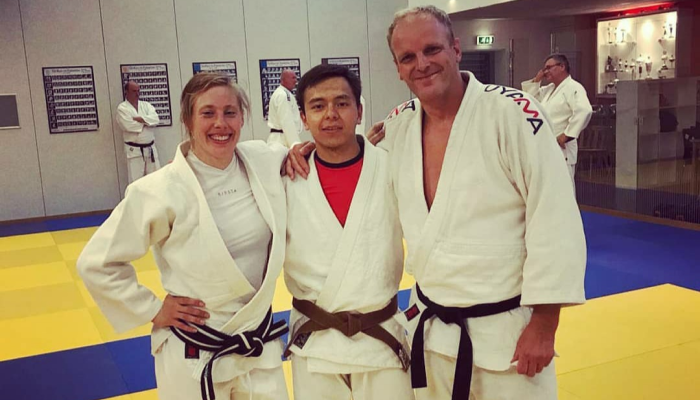
I had not made a final choice between studies and sports up until my last year in high school. Having been severely injured, I gave up the sport and returned to studying. I’m not sure if I made the right decision; it might be because I was psychologically weak and exhausted. But now, looking back I don’t regret it. I had the whole year ahead of me for studying, and I spent it in local libraries and at home. Again, I found myself participating in competitions on mathematics, where I made it to TOP 3. I successfully passed all exams, received a state grant, and got accepted into Programming at one of the best Universities in my country.
I enjoyed programming, but I did not pay enough attention and spent little time studying. All I did was submitting assignments on time and studying only those technologies that were covered by the syllabus. However, when I was doing my third year, we got a new teacher, a Python guru, who was so passionate about the language and different environments, that I just could not resist the temptation to dive into it. This is how I got involved in web development.
Please, tell me your career progression: what did you do before and how you ended up in a position you’re currently in?
After I finished my third year at the University, I was offered a well-paid job as a developer. However, I ended up working there for just 2 days. For those brief moments, I realized I would never grow there professionally. Instead, I wanted to work for my teacher, Herman, whom I described earlier. He opened up a company called <LLC TENET>, an outsourcing agency based at the University’s Technopark. There were three of us, students from the 4th year, and a couple of freshmen. At first, we worked for free, starting from developing very basic websites, but after a while, Herman began to organize camps and speeches, and a few months later he began to pay us. After University, I ended up working for several companies on different projects. Currently, I’m working on an exciting accounting project ZipHR as a Python-Backend developer. When I first embarked on the project, coding left much to be desired. Our team (which is three senior and two middle developers on the backend and three seniors on the frontend) began to improve the architecture, increase productivity, performance, and test coverage. We decided that each developer would be responsible for a couple of heavy modules. That was how I became responsible for the export/import of data into various formats (like csv, xlsx, pdf, etc.) and multi-continentality because the project covered several countries.
What programming languages do you know, how did you learn them? Do you think you can call yourself a self-learner? What are your favorite technologies?
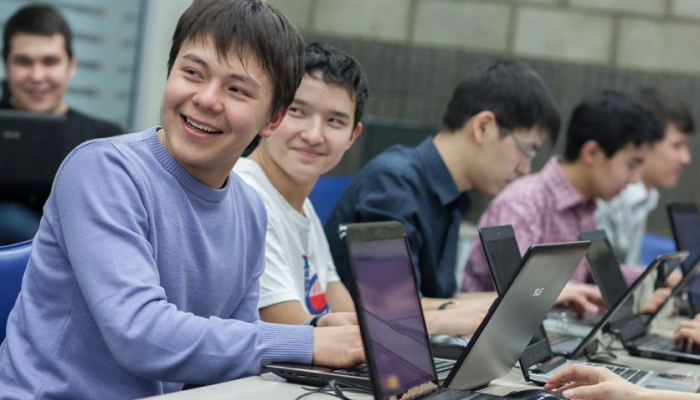
Well, I will never say that I know this or that programming language. However, I can list programming languages and technologies that I worked with, and these are Python, Java, Android, JavaScript, Node.js, TypeScript, and React. I learned to program through trial and error, thanks to my teacher, and educational clubs we had at the University. Then I began teaching myself. There was this club called Education Club, where I was both a member and a president. At first, I taught physics and mathematics to high school seniors, and then programming — to freshmen and sophomores. That was how I learned to program — through teaching and being taught. My favorite programming language is, of course, Python. It’s very easy, flexible, and comprehensible. I think Guido Van Rossum, the creator of the language, has truly made the best programming language ever. I also prefer back-end, because I think the problems we solve at the back-end are more challenging. I think the reason might be my deep love for mathematics.
Please, tell me about your plans for writing a Python tutorial?
I teach at the University for about 3 hours a week, just how Herman did it back when I was a student. I mainly use his materials for teaching, but I also wanted to create something of my own, to contribute to the learning community. The study guide I intend to write starts from installing OS Linux and finishes at deployment with Docker. I think I might finish it by this autumn. Hopefully, I hope I’ll do so and share the link with you.
How did you end up freelancing? Why did you decide to leave office work? What advice can you give programmers who want to kick off their freelancing careers?
Freelance is amazing. I have colleagues from all over the world. I work on projects I really like. Above all, I am paid well. Honestly, though, I work more than I used to, which is a great thing, I guess. There’s no time for idle conversations with colleagues. I just do my job and I’m very excited about it.
If English is not your native language, I’d advise you to work on that first. Then, work on your discipline. And of course, study. I think you have to be at least a middle developer. So if you’re a junior, then stay at the office for a while and learn from others.
What are the challenges you have to deal with daily being a freelancer? What does your typical day look like? What are the differences between a day at work at the office and on freelance?
Thanks to judo, I don’t have any problems with discipline. But I’ll be honest with you, sometimes I find it difficult to register the hours I put into work. I think I work way more than in the office. At the office, you have talks, discussions, conversations that are often unrelated to work, that way time flies faster and sometimes less productively so.
I work from home. But sometimes I get extremely bored and go to my friends’ office. My daily routine usually looks like this: I wake up and work from 7 am till 10 am, then I have breakfast and take a nap. From 11:30 to 15:30 I work and then take a nap again. After I wake up, I jog for a while and then work again till late in the evening. Sometimes I have to change my schedule, but it’s more or less the same every day.

Do you plan to relocate anywhere? How is it in Kazakhstan for you? What’s the political situation? Do you have any concerns about your country’s future? What do you think your state’s missing and how you would fix that?
Yes, I would love to relocate to Europe or the States. I think I will try to find work abroad in two years. But for now, it’s freelancing and teaching.
Kazakhstan is a painful subject for me. I am a very funny and laid back guy, but whenever I think about my country, I become super depressed. I think the economic and political situation in Kazakhstan is just as bad as in any post-soviet country. I do believe in youth, however, who after the Soviet people are gone from this world, will try and change the system. There are young people like that already, but these are just a few. There’s another type of youth, though, that doesn’t care about education or finding themselves. I will never understand people who break the law saying, “well, everyone does it.”

There’s this lack of attention from parents to the education of their own children. There’s a lack of proper attention from students and very little respect for teachers. I think teachers should be respected more than governmental officials. We can change that attitude by changing the education system.
What are your life goals? What would you like to achieve in life?
I am a Muslim. And just like for every other Muslim, my goal is living the life according to Allah.
Career-wise, I’d like to try and work for such companies like Google, Amazon, etc.; become an IT architect, contribute to developing IT in my country.

What was the most difficult project you had to work on?
I was once working on a project that was aimed to track workers and their working hours. At first, it seemed really easy but turned out to be a pain in the neck. The thing is, a lot of developers who were working on the project left it together almost as soon as I stepped into my role. There was no documentation, architecture was pretty horrible, and coding left much to be desired. Moreover, the frontend was in React and backend on Node.js, which I had not had enough experience with. But I made everything possible for the client to stay content in the end.
What do you think is the future of front and backend solutions? There are a lot of frameworks and libraries at the moment, do you think they will combine or compete against each other?
I think JavaScript really kicked off for the past couple of years. Every day there’s something new. JavaScript is now both on the back end and on the front end. It’s practically everywhere. I think the solutions will compete fiercely.
What’s the future of Python? What’s your attitude towards Machine Learning?
I hope Python will achieve its original goal, meaning so that Python programming will be taught from elementary school up. Thanks to its elegance, simplicity, and environment, Python is popular way outside the simple world of programming and web development. That is why I think the Python community should concentrate on Python productivity (PyPy, JIT compilation). Machine learning is fun and it’s most probably — the future.
Tell us how you got into Soshace? Which interviews did you have to pass?
I came back to Kazakhstan from Amsterdam and decided to pursue freelance. I applied for Toptal. My friend sent me a link to the vacancy posted at moikrug.ru and I applied for Soshace at the same time. I was taking the second interview at TopTal when in Soshace I was on the third and final interview. While I was waiting for a reply from TopTal, I got an invitation from Soshace, which I welcomed and accepted wholeheartedly.
Now about interviews.
There was a very long conversation with an HR representative that lasted more than one hour, where I was asked almost everything about myself, my career, goals, and English language.
Then there was a 2-hour test on different technologies and topics, like Python, Algorithms, SQL, HTML, JS, and CSS.
And finally, there was an interview with a developer, where I had to solve an algorithmic problem and answer various programming questions.
How did you land a job through Soshace?
After I successfully passed the interview, my manager got back to me and said that there were two clients interested in my candidacy, and there were from the US and Singapore. After a few days, a client from Singapore sent me a test task, which I quickly finished. Next week the client scheduled the interview, which I successfully passed, and the very next day I was already employed.
What hobbies do you have? How do you spend free time? Do you have any web development books you can recommend?
I don’t have much free time, to be honest, but I do have different hobbies still. I play guitar, soccer, sing. I read and write every day.
My favorite books on web development are Fluent Python by Luciano Ramalho, and Clean Architecture by Robert Martin.
—
Meanwhile, if you want to share your story, your career goals, aspirations, or opinion on the future of web development, you can always reach out to me at vorontsova_mi {at} soshace.com or ping me on Twitter at MaryVorontsov.



